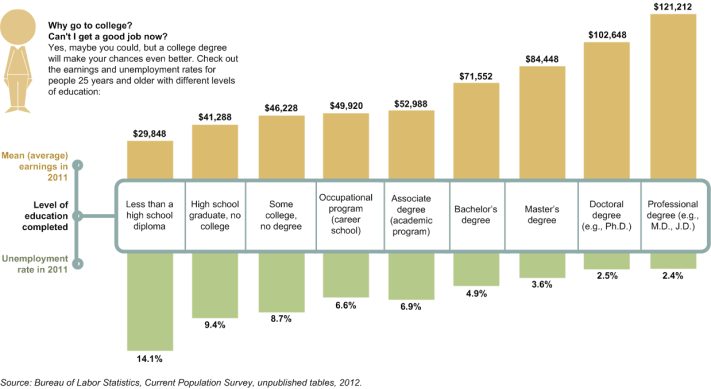As I am a Community Assistant (CA) in my dorm, I must address the needs of my residents, all of whom are freshmen. During the last few weeks, several residents in my House have received scores from their first round of papers and exams. As I was preparing to give them advice and be their life coach, I reflected on my freshmen year experience. I came to the University of Michigan as a completely undecided student. Growing up, I had always worked hard in school. I had lived one day at a time, while focusing on how I could succeed as a grade school student. Unlike many of us, I never thought about the future. “I’ll worry about that when the time comes,” I would always tell myself.
When I arrived here, I continued with the same mentality. I explored and took a wide variety of classes that dealt with a plethora of fields, such as science, math, literature, etc. Furthermore, I challenged myself. In order to truly learn my interests, I took very rigorous classes. When people asked me what I was studying, I told them I was undecided. Even though some of them looked at me like I was funny, I knew that I was doing what was right for me. If there was any time for me to experiment, college was the right time to do so. As I was looking for challenges, my grades were not what they had been in high school. Unlike many of my peers here, I was not looking for simple classes, just to boost my GPA. I truly wanted to find my passion and run with it.
LSA requirements have allowed for me to explore different fields.
After two years, I decided to major in Economics and Spanish, as those were two subjects that had earned my interest. Furthermore, I decided that I would like to go to law school after I am done with my undergraduate career. Despite my passion for such a quantitative field like Economics, I had performed much better in my classes geared towards reading and writing. More importantly, I enjoyed a Spanish class I took last semester: Spanish 283 – Spanish for the Professions (Legal). It introduced me to the field of law. I fell in love with the intense amount of reading, the array of topics within the field, and the organizational skills that are required while practicing law.
Over the summer, I researched law schools and their requirements for admission. It seemed as if gaining admission to the best schools is a huge numbers game. Your GPA and LSAT are two essential factors, and they can make or break your application. That being said, this year, I have immediately shifted my mentality towards my education. Instead of giving 100% of my attention towards the value of my learning experience, I have attended class with the idea that grades are my Number One priority.
Connecting my college experience to Louis Menand’s “Live and Learn,” I have gone from practicing Menand’s Theory 2 to his Theory 1. Theory 2 states the following: “In a society that encourages its members to pursue the career paths that promise the greatest personal or financial rewards, people will, given a choice, learn only what they need to know for success.” During my first two years, my goal was to find a subject that I was passionate about. Once I found it, the plan was to master that field as much as possible.
However, after realizing that my grades may determine whether or not a law school accepts me, I have had no option but to practice Theory 1, which says that college is a process that separates its more intelligent members from its less intelligent members. At the end of the day, those who receive the best grades will impress professional schools and employers. Therefore, I must receive better grades than other college students, so I can earn bigger and better opportunities than them. The value of my education does not seem to be as important anymore.
Students who desire attending professional school and/or landing a stable job must maintain superior grades.
Why is it so important to be at the top? After all, shouldn’t I just pursue my passions and be happy with that? Why do I have to be better than everyone else? As mentioned, better academic performances may lead to more opportunities to attend graduate school, and studies show a direct relationship between amount of education one receives and his or her average earnings:
More education correlates to higher earnings and lower unemployment
Why is it important to make money? According to renowned psychologist Ralph Smart, the amount of education and salary one possesses can determine where he or she falls on the latter of social status. At approximately four minutes and 45 seconds in the below video, he states the following: “Many of us, we use our qualifications to give us status. Many of us, we suffer from status anxiety. The professor looks down on the person with the PhD. The person with the PhD looks down on one with the Masters. The person with the Masters looks down on the one who has a degree. Someone who has a degree looks down on someone who doesn’t have anything.”
His statement represents why individuals work so hard throughout their educational careers. They practice Menand’s Theory 1 and strive for the highest grades. By doing so, they separate themselves from less intelligent people, so they open up more opportunities to attend graduate school and eventually earn a higher salary. As a result, they may come to be well-respected by themselves and others.
I shall return back to the beginning of this post. What did I say to my residents? Obviously, I made them feel comfortable by reminding them that they go to one of the best schools in the world. However, I emphasized that it’s important for them to worker harder next time, because grades truly do matter in this modern, competitive society.



I really liked your post “Grade Do Matter” where you shared your views on the different educational philosophies people can carry throughout college. It’s interesting how you said your approach to learning—as related to Menand’s theories—has changed quite a bit since you’ve been enrolled as a college student. I’ve never really thought of it that way, but I guess mine has too. So much of elementary school and high school is designed to create a generally educated student body. In institutions of higher education, challenging exams and assignments serve to determine those fit for prestigious job positions and graduate schools. Arguably the most difficult part of college is understanding how to advance your own educational status within such competitive academic cultures. Your final point was also fascinating. While yes, our society’s social structure is often dictated by the amount—of lack thereof—of education an individual receives, that isn’t always indicative of someone potential success. Many would argue that “success” is unquantifiable. Salary is the most commonly used indicator in determining our achievement, but consider happiness as equally important.
LikeLike
I completely agree with what you are saying. In a dream world, grades would not be most important in this society, but unfortunately as most of us have come to realize, that is not true. I came to the University of Michigan pretty much undecided as well, but i was (and still am), deep down hoping to apply to the school of public policy. Realizing this, all of a sudden made grades that much more important to me. When I got a C on my first Econ exam i was crushed. Econ being one of the prerequisites for the school I knew the class was important. In the case of that exam, a C was the average, but wanting to apply to another program, this was not good enough. “Being average isn’t something to be ashamed of at The University of Michigan” my mom said to me, but i knew that in my case, it wasn’t great. Now I’d like to say that as long as i’m learning something and getting that well rounded education but as you said, The numbers are the most definitive “proof” of our abilities. And the thing that programs look at.
LikeLike
It is interesting to view the college system this way but I like to view it differently. I like to believe that I came to school and can still take interesting classes and succeed without getting perfect grades. Maybe I feel this way because I don’t plan on attending graduate school and my actual grades don’t matter as much as others. However, it is still an interesting view point and I think that you need to tell your students this opinion, which is more or less the truth, in a sense. Thus, I don’t know if I actually agree with your definition of “success.” Do I have to have a high GPA to be successful in this world? I don’t think so. I think that a degree is more relevant than the numbers of it.
LikeLike